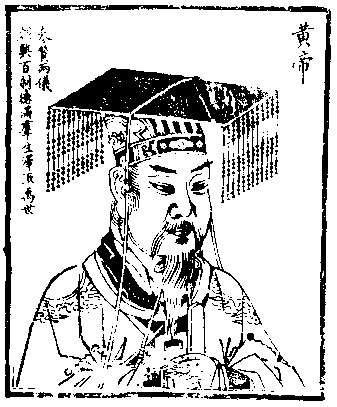
Legendary emperor of China and Taoist saint, b. c. 2704 BC.

Huang-ti; from the 1498 edition of Li-tai ku-jen hsiang-tsan; University of Hong Kong collection
There are no historical documents of Huang-ti. According to Chinese legend he is the third of the first emperors in Chinese history. The beginning of Huang-ti's reign, traditionally given as 2697 BC (when Huang-ti was 7 years old), is usually taken as the beginning of Chinese history, although archaeological evidence does not reach further back than 1760 BC (the beginning of the Shang dynasty).
Huang-ti is reported to have had a dream of a kingdom where people followed the virtues of early Taoism (which did not develop until 2000 years later) and could enjoy life in peace. According to legend he strived to establish such a kingdom. Victory over "barbarian" tribes in about 2667 BC secured him the control of the Huang Ho (Yellow River) plains.
Nearly all achievements of early Chinese civilization are attributed to Huang-ti. He is said to have introduced wooden houses, carts and boats. He introduced bow and arrow into warfare. Some credit him with the invention of script and the introduction of coins. The first legendary handbook of Chinese medicine (the Nei Ching) is associated with his name. His wife is said to have introduced the breeding of silkworms and the fabrication of silk.
According to legend Huang-ti became an immortal after his death. He is considered the patron saint of Taoism.